MAD Digest: The Dream of a 40-Hour Work Week
This month's newsletter includes a deep dive into long hours, an interview with Credo sommelier César Garduño, a big announcement from Academy, and pics from a very glou glou MAD Monday.
LONG READ
Changing the clocks ⏱
Chef hours have been notoriously extreme for pretty much as long as there have been restaurants. Is that just part of the job or is it a lack of imagination?
A lot of people in the food world are very, very excited about Vyn, for all of the typical reasons that people in the food world get very, very excited. Located on a Swedish hillside overlooking the Baltic Sea, chef Daniel Berlin’s new restaurant, which opened late in October, has gorgeous views and sweeping design. The service is warm and polished. And the food itself is extraordinarily delicious: the cooking sharply honed to let shine the quality of the ingredients, while still expressing clear personality and vision.
But there’s another reason to be excited, an aspect of Vyn that is just as innovative and potentially more influential than anything Berlin might put on the plate: the schedule. The staff at this creative, refined, and above all, ambitious restaurant work only four days a week.
In most other professions, that would hardly be cause for celebration. But restaurants, as we all know, are not most other professions. Even now, well into this season of collective reckoning, when the industry is interrogating and attempting to reform its old ways of doing things, 50- or 60- or 70-hour work weeks remain the norm. And in no corner of the profession does that norm seem more resistant to change than in fine dining.
In this issue of Digest, we try to unpack the reasons why work schedules have proven so intractable. And eternal optimists that we are, we also look at a place that—like Vyn, and like a handful of other restaurants around the world— is attempting nothing short of changing the clock.
Read the full article.
ACADEMY ALUMNI
5 Questions with César Garduño
Every month, Digest interviews a MAD Academy alum. In this issue, we check in with César Garduño, whose career has taken some unusual turns in the last few years. For one thing, the 29-year-old sommelier ended up working in a couple of places—first Dill in Iceland, now Credo in Norway– that could not be further, geographically or culturally speaking, from his home in Mexico City. But his time in the North has also convinced him that the region will play a significant role in wine’s future. And he’s attended Academy not once, but twice. Here, he explains all the reasons why.
You've worked in some extremely Nordic locations, first at Dill in Iceland and now at Credo in Norway. How did a sommelier from Mexico City end up in the far North?
“After culinary school, I was working as a sommelier at a resort in Mexico where I had all these customers who would say, ‘This is great, but have you been to this country or that country? The wine there is amazing.” I started thinking I needed to go away to see what's going on. The Nordics always been really interesting for me, and at the time, Iceland was—I don’t want to say Covid-free, but it was easier to go to. But also I was like I don't even know where Iceland is. So I did some research, and eventually, I found Dill. I thought what they were doing wine-wise was super cool, so I just applied to see what happened, and it happened. The first six months were crazy because being from Mexico City, I’m used to being around millions of people. And then I arrived to Reykjavik and there’s no one, and culture-wise, it’s so different. Being from Latin America, you want to hug and kiss everyone, and people definitely don’t do that in Iceland. So it was a big shock at the beginning, but I ended up staying for almost two years.”
“Then I wanted to keep traveling around the Nordics, so I started to do some research about the restaurants in Denmark, and Sweden but with my passport, it was easier to obtain a visa for Norway. I started looking into which restaurants there are working with food and wine in a certain way, and then I talked to Heidi (Bjerkan, the chef and owner of Credo), and it all fell into place.” …
Read the full Q&A.
NEWS & EVENTS
Announcing MAD Academy 2024
Since 2019, MAD Academy has distilled the industry's best knowledge into game-changing tools to drive positive change in hospitality. Now, we're excited to launch our programming for 2024: a range of exciting courses for both individuals and businesses.
💡 For changemakers and rising leaders
We're back with our tried-and-true five-day tracks: Leadership & Business and Environment & Sustainability. Each intensive course offers a dynamic education taught by luminaries of gastronomy, science, business, and the arts while introducing you to an inspiring global community of hospitality professionals. And we haven't even mentioned the food!
🚀 For forward-thinking businesses
Our custom programs are specifically designed for teams and businesses to cultivate better leadership, boost creative thinking, and strengthen environmental stewardship. Leveraging our network of leading chefs and experts, we create and facilitate bespoke courses to address a range of topics such as circularity, psychological safety, leadership, foraging, fermentation, and much more.
Read more and reach out today.
A Very Glou Glou Monday
We kicked off first MAD Monday of the season on October 23 with a debate on whether natural wine needs protection. The setting was gorg, the audience was stellar, and the discussion among Alice Feiring, Katie Worobeck, Christian Binner, Emma Bentley, and moderator Aaron Ayscough was both enlightening and provocative—as was the blind tasting organized by noma sommelier Ava Mees List. We’ll be making the audio available soon for those of you who couldn’t make it, but in the meantime, a few pics from photographer extraordinaire, Emily Wilson.

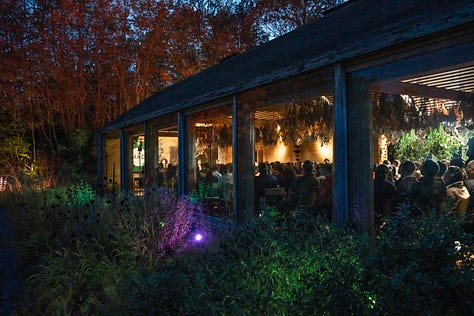
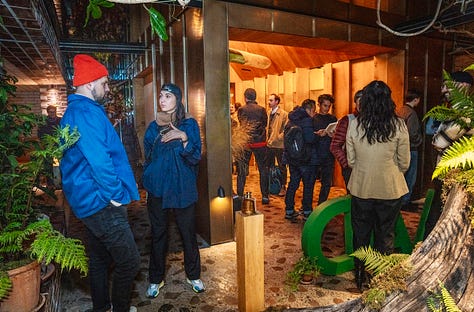

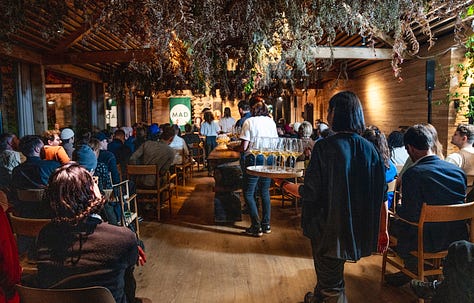
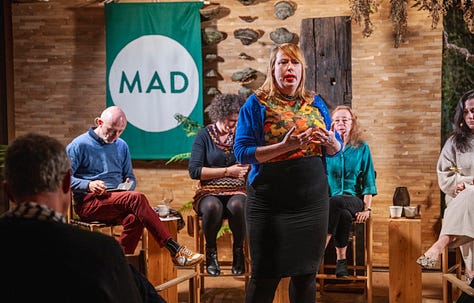

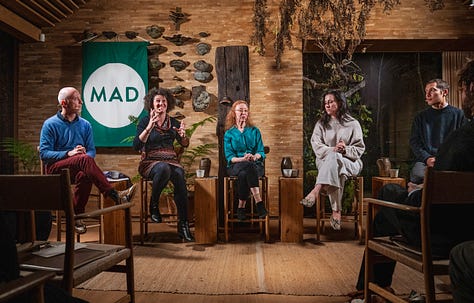
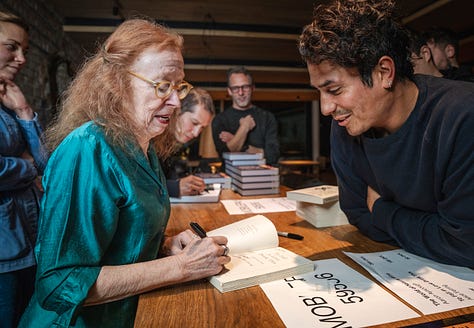






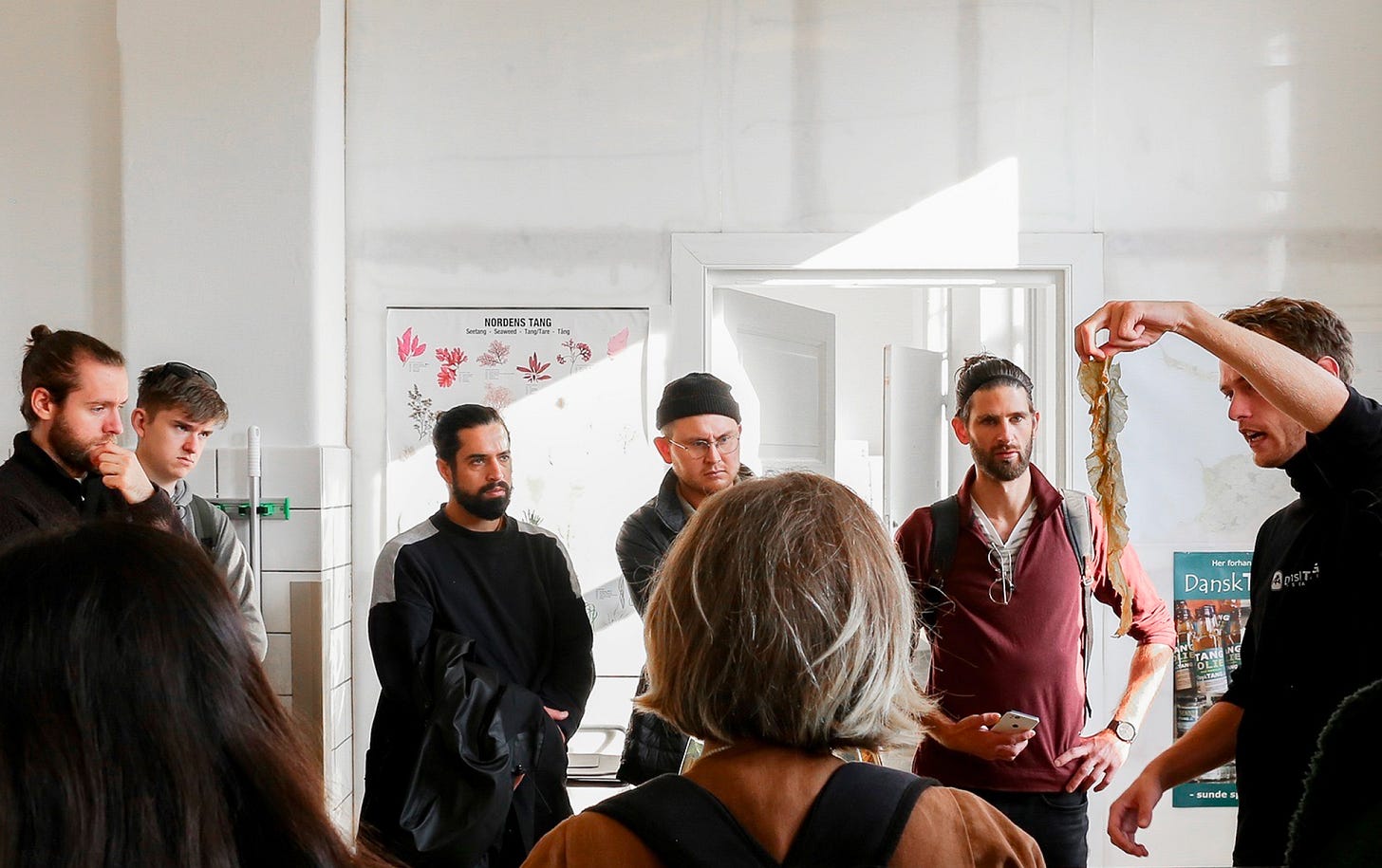

In my restaurant shifts were 4 days on, 2 days off.